In this issue:
Rabbinic Insights: The fallacy of "Whatever"
Gert Thaler Tribute
Studying Yiddish in Poland
Jewish license plate
Arts in Review: 'Time in a Bottle'
Obituary
Jewish Community Calendar
_______________________________________________________________
Rabbinic insigHTS
The fallacy of 'Whatever'
By Rabbi Wayne Dosick
The Elijah Minyan
CARLSBAD, CA—The last issue of the late lamented San Diego
Jewish Times carried a letter-to-the-editor from a very
distinguished and esteemed member of this community. In part, it read,
“I am frequently saddened by the intolerance of many fellow Jews who assert
they are liberals, ask for tolerance, yet often do not extend tolerance to
fellow Jews who disagree with them politically....There are many Jews who
for their own reasons — financial interest, conservative ideas, or
preference for one candidate over another — vote Republican. Too often I
hear Jews in conversation who look down on fellow Jews who say they vote
Republican....As a lifelong Democratic voter, I feel it ill suits those Jews
who expect tolerance in the
marketplace of ideas to deny tolerance to fellow Jews whose opinions may be
different from their own.”
The letter-writer has too much class and dignity to name names, make ad
hominem arguments, or personal attacks. Yet, since the esteemed
publisher & editor Mike Schwarz and I were the ones who most frequently
wrote about this issue in The Times, I will assume that the letter
writer refers to us. I cannot speak for Schwarz, so I take responsibility
both for the charge and its response.
First. I thank my friend the letter-writer for the measured and kindly way
he made his firm and clear assertions. And, at the same time, I wish to
enlarge the issue far beyond his particular issue.
If you are old enough, you remember the many late-night “bull-sessions” we
held in our college dorm rooms. Politically and culturally aware and caring
young people debated the issues of the day with conviction and with passion.
We had strong, intense, and zealous opinions and positions. We weighed the
opposing opinions, and we took firm stands for our own discernments and
judgments.
And, we were not content to let our opinion stand as one among many. The
debates raged. We forcefully tried to convince others that our position was
the right position, and all others were flawed and false. And, our debating
opponents tried, just as forcefully, to change our minds to embrace their
views.
Without taking “full credit,” those passionate discussions — which wound up
in the streets — led (at the very least) to civil rights for all
Americans, an end to war, a feminist evolution, a cultural revolution, and
the downfall of two presidents.
Been to a college lately? First, there is far less political and culture
awareness than in our day. But, more importantly, the debates are virtually
stilled. One person expresses and opinion; the other person expresses the
diametrically opposed opinion. And, instead of asserting their cause,
instead of trying to convince and change minds, the prevailing attitude is:
“Well, you have your opinion and I have mine. We just disagree. And, we
have to respect each other, and each other’s right to an opinion.
Whatever.”
“Whatever” has become the response to all disagreement, all difference of
opinion, all argument. “Your way or mine. Whatever. Either way is fine.
It really does matter. Whatever.” It is hard to say if the current
attitudes on college campuses have pushed up into the world, or if the
current practices in the world have drifted down to the college campuses.
But, this lack of willingness to take a stance, to make a discerning
judgment, to express an opinion, and convince others, is a clear reflection
of the “politically correct” world in which we now live. People are afraid
to judge, to declare an opinion, lest another be challenged or offended.
If everything is all right, if everything is equal and equally acceptable,
then, surely, we have lost our sense of right and wrong. When everything is
acceptable, when any position or opinion is equal, then we no longer have
the discernment to judge between right and wrong.
We no longer ask: “Is it right?” Instead, we ask, “Is it politically
correct?” “Is it acceptable to the majority?” “Can we make sure that no
one is offended?” “Can we build a big enough tent so that there is room for
every possible variation?” “Can we be everything to everyone?”
There is nothing wrong with group process; there is nothing wrong with
trying to build a coalition; there is nothing wrong with trying to achieve a
majority. There is nothing wrong with consensus.
But, there is everything wrong in not having a clear sense of right and
wrong, in not having a value system, in not having a moral compass.
“Whatever” is not a valid response to a moral issue. “Yes” or “no” is
the response. Moral courage is the ability to say “yes” or “no” and really
mean it. And, often, the greatest moral response is the courage to say,
“no.”
We Jews know this tradition well. Every Shabbas and holiday morning,
we read a selection — called the haftarah — from the biblical
prophets. We often lose the message, because we do not know the Hebrew, or
because the lovely tune in which the haftarah is chanted is so
melodious and lilting. But, the words of the Hebrew Prophets shout out for
social justice in the most harsh and demanding way.
“Cry aloud, spare not...Declare to My people their transgression...You
call this a fast? a day acceptable to the Lord? This is the fast I have
chosen: to loose the fetters of wickedness, to undo the bands of the
yoke...to give bread to the hungry...to care for the poor who are cast into
your house...to cover nakedness...That is the way you bring
righteousness.”
“A sinful nation, a people laden with iniquity...they have forsaken the
Lord....To what purpose is your multitude of sacrifices [worship] to Me?
Bring no more vain obligations...your offerings are an abomination to me...I
cannot endure your iniquity.” And from our prayers, “Because of our sins, we
were exiled from our land.”
The ancient prophets teach: There is no equivocation. There is no
“Whatever.” Right is right and wrong is wrong. There are God’s standards
of ethical and moral behavior that must be met, or there will be severe
consequences.
Standards of morality have, surely, evolved since biblical times (no more
slavery; equality for women) through a process of growing human
consciousness and elevated moral stance. .
Yet, even in this open and accepting age, the time has come to examine
our souls and our actions, and to decide that not everything is acceptable;
that not every opinion has validity in the marketplace of morality; that not
every special interest, every self-interest, has an equal place.
And, as Jews, we have to make our choices not as the letter-writer would
have it by “financial interest, conservative ideas or preference for one
candidate over another, but by the prophetic voice of social justice that
echoes throughout the centuries.
In a recent editorial, in TIME magazine, Joe Klein told of the
presidential aspirations of the former Governor of Arkansas, Mike Huckabee.
“Several weeks ago, I watched as Huckabee lost an audience at the National
Review’s Conservative Summit with talk of feeding the hungry and health
care. ‘I think he’s in the wrong party,’ a gentleman from Pennsylvania told
me.” A political party that puts personal financial interest above the
God-given mandate to feed the hungry and clothe the naked is no place for a
Jew! That is not just a matter of tolerance or intolerance, not just a
matter of opinion or “Whatever,” but a matter of right and wrong.
The time has come for our society — and, particularly, our Jewish society
— to say, “You have the right to say and do anything you choose. But, what
you say, what you choose, may not be right.” And, certainly it is not
right when it comes to self-interest above decency and dignity for each and
every human being — every one of God’s children — on the face of God’s
earth.
Editor's Note: We welcome letters whatever your opinion.
Of course, we reserve the right to disagree with them. Let us know
your opinion by sending it to editor Don Harrison at
sdheritage@cox.net
Advertisement:.J
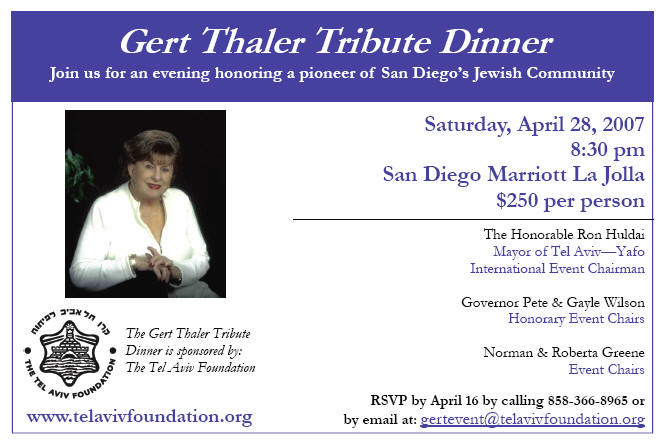
oin
us.ening honoring a pioneer of San Diego’s Jewish
Summer Yiddish culture and language study
program in Poland set by Shalom Foundation
San Diego State University Prof. Lawrence Baron
has passed along the information that the non-profit Shalom Foundation will
be offering a seminar in Yiddish language and culture from August
13-September 2 in Otwick, Poland, about 20 miles from Warsaw.
With programs at the beginner, intermediate and advanced levels, Shalom
Foundation will provide 60 hours of intensive Yiddish language instruction
in two class sessions per day. There will be workshops on dance,
Yiddish songs, theatre music, and films. Additionally there will be
tours of Jewish landmarks in Poland.
Faculty members are being drawn from many places. Among them will be
Dr. Chava Lapin of Workmen's Circle in New York City, Dr. Jacob
Weitzner of Warsaw University; Dr. Paul Glasser of YIVO
Institute, N.Y.; Malgorsata Koziel of Lodz University; Adam
Gruzman and Pnina Meller of Israel; Jan Jagielski of the
Jewish Historical Institute of Poland and Leon Blank of Sweden.
Mire Khaye Seigl and Motl Didner, participants in the National
Yiddish Theatre Folksbrine of New York, will lead the theatre and music
workshops.
The seminar fee, not including transportation to Poland, is $500. This
includes lodging and three meals daily. More information about the
program may be found by clicking here
for the Shalom Foundation website.
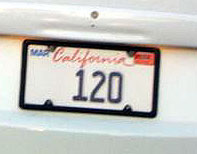 You
Should Live To—Melanie Rubin, who has perfected the art of Jewish
license plate spotting, found another one. Seeing it reminded Nancy
Harrison of her beloved late grandmother, Fannie Fischer, who
spoke Yiddish, Hungarian and English. Zei Gezeundt, Un Hunnert und
Zwanzig! were her words of blessing for everyone she loved. You
Should Live To—Melanie Rubin, who has perfected the art of Jewish
license plate spotting, found another one. Seeing it reminded Nancy
Harrison of her beloved late grandmother, Fannie Fischer, who
spoke Yiddish, Hungarian and English. Zei Gezeundt, Un Hunnert und
Zwanzig! were her words of blessing for everyone she loved.
______________________________________________________________________
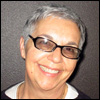 Arts
in Review Arts
in Review
If I could put time in a bottle...
By Carol Davis
If I
could put time in a bottle, I would make sure that all of the plays
I
recently saw, could be around long enough to be seen by many more. I’d push
the closing dates up so those in a time crunch could get a taste of what it
is about the theatre that excites me. And I’d want to spend more time
talking about what we saw and what we would like to see more of. Four of the
plays closed on April 1st (That’s what I call a bad joke).
The Farnsworth Project is a page to stage presentation by the La
Jolla Playhouse that does not allow reviews, (certainly those who did see
it should have spread the news by now.)
Taking Flight, The Piano Teacher, and The Adoption Project,
are gone and on to their next venues. And all are worthy of another look
back at why they should have been here longer and seen by more.
Taking Flight
Taking Flight by Adriana Sevan and directed by Giovana
Sardelli is a ninety minute or so personal experience that
this talented playwright/performer brings the audience in on in an effort to
tell her compelling tale of friendship, devotion, devastation and healing.
In
one fell swoop, we are drawn into her narrative like bees to honey by Sevan.
It is not only whirlwind in nature, it is also breathtaking in scope and
mystical in it’s storytelling components. It takes place in New York right
after the 9/11 terrorist attacks on the World Trade Center and her best
friend is hit by debris from the falling steel of the towers. It all but
crushed her body. They were best friends, she and ‘Rhonda’. They were
planning Rhonda’s wedding. She was planning Rhonda’s wedding. They had
grandiose plans, these best friends.
That all vanished on that fateful morning, and instead of planning a
wedding, she was planning for her friends survival. And if wishing, wanting,
being there and devoting ones entire self to that project was what it would
take, she was in it for the long haul; her personal life be dammed.
So her journey began.
Dressed in a pair of jeans and a colorful blouse and set on Victoria
Petrovich’s simple design, a single chair in the center of the stage with
flowing white curtains in the background surrounded by a margin of sand
around the edges with glass bowls filled with water, a lone flower floating
and a poem by Rumi. (‘The way of love is a subtle argument, the door there
is devastation. Birds make great sky circles of their freedom. How do they
learn it? They fall, and falling they’re given wings’), her story is
compelling. Jose Lopez’s subtle lighting effects go back and forth from
reality to dreamlike and reinforce the reality of her story.
The Piano Teacher
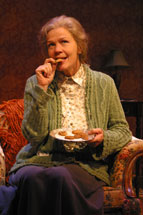 Heading north to Costa Mesa and The South Coast Repertory Theatre, Julia
Cho’s The Piano Teacher was the theatre’s 100th world premiere.
Another one of those under the radar gems, Linda Gehringer is Mrs. K. a
retired piano teacher who, sitting in her living room munching on cookies
and tea (she offers them to the audience as well), looking like the kindly
grandmother we would all love to have, goes back into her memory bank and
reflects on her Heading north to Costa Mesa and The South Coast Repertory Theatre, Julia
Cho’s The Piano Teacher was the theatre’s 100th world premiere.
Another one of those under the radar gems, Linda Gehringer is Mrs. K. a
retired piano teacher who, sitting in her living room munching on cookies
and tea (she offers them to the audience as well), looking like the kindly
grandmother we would all love to have, goes back into her memory bank and
reflects on her
___________________________________
Linda Gehringer in The Piano Teacher
Photo: Henry DiRocco
-----------------------------------------------------
students; wonders about their whereabouts; puzzles over why
she never hears from any of them, and why so many of them left
so suddenly.
Cho’s play and Gehringer’s demeanor set the tone as the suspense of there
being something more than a retired piano teacher wondering about her
students. As she ruminates, glimpses of some long and hidden hurt? guilt?
secret? doubt? buried in some dark recesses begin to surface and after two
former students finally do pay her a visit, we learn even more, but nothing
really definitive as to who Mrs. K really was and why the lessons ended so
abruptly.
Somewhat confusing thoughts emerged as the play wound down, unanswered
questions surfaced and if any positive suggestions would be accepted, it
would be for the first act to be a little shorter and perhaps a little more
information as to what Mr. K really was about. But, maybe that’s the way the
playwright wanted it. Overall however, The Piano Teacher seems headed
for other venues. It’s new and will be around for some time.
Under Kate Whoriskey’s deft direction, Myung Hee Cho’s scenic and costumes
and Jason Lyons fine lighting design The Piano Teacher is a treat and
one to catch next time around.
The Adoption Project: Triad
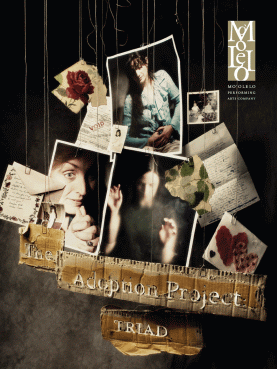 Mo’olelo Performing Arts Company recently presented The Adoption Project:
Triad written by Kimber Lee, directed by Seema Sueko and starring Jo
Anne Glover, Sandy Campbell and Linda Libby, three of San Diego’s finest,
portraying Aggie, an adoptee, Bernice, the adoptive mother and Madeline,
Agee’s birth mother. Mo’olelo Performing Arts Company recently presented The Adoption Project:
Triad written by Kimber Lee, directed by Seema Sueko and starring Jo
Anne Glover, Sandy Campbell and Linda Libby, three of San Diego’s finest,
portraying Aggie, an adoptee, Bernice, the adoptive mother and Madeline,
Agee’s birth mother.
Adopted children usually have one thing in common, they need to find their
roots. Years ago, for some draconian reason, adoptions were sealed and what
was done, was done. It was too bad if the child wanted to find his or her
biological parents. For the reasons those in ‘the know’ enforced this rule
there were that many more reasons for it to be abolished. For The
Adoption Project, set in the wide space of the Centro Cultural de la
Raza in Balboa Park this very same issue is examined and from every possible
angle, aspect and psychology.
With the use of television clips, beautiful, raw symbolic dancing (Erika
Malone) effective lighting (Kim Palma) and some of the most striking and
compelling acting seen in some time the project angles along with one
convincing scene after another overlapping, swerving and in some cases
careening into itself. It is an emotional roller coaster ride, sometimes
funny sometimes frightening but always on target.
Mo’olelo Company, headed by Seema is to be congratulated for it’s fine
efforts in the community for bringing pertinent issues to the fore.
See you at the theatre.
Obituary
Clarence Kaufman (Dec. 2, 1922—March 15,
2007)
ANAHEIM, CA—Beloved husband of Anna. Loving and much
loved father of Ellen Kaufman Dosick (Rabbi Wayne Dosick), of La Costa;
Terry Kaufman (Gary Weinberg) of Sacramento; Betty Kaufman, of Mountain
View; and Norma Kaufman (Dr. Michael Meltzer) of Oakland. Cherished “Papa,”
grandfather of Illisa and Jacob Weinberg and Jordanna Meltzer.
A native of Chicago, Mr. Kaufman served in the Civilian Conservation
Corps., and then, during World War II, in the Army Signal Corps.
He was stationed in the South Pacific and then in Paris, training
commandeers and troops in the use and then redeployment of radar and
electronic equipment. He remained a great patriot and involved citizen
(being a Roosevelt-Kennedy Democrat in John Birch’s Orange County was no
easy task!) and, in his later years, served as a member of the Orange
County Grand Jury, and as a commissioner on the financial audit committee
which brought the county out of its bankruptcy.
On the GI Bill, he earned a bachelor’s degree from Illinois Institute of
Technology, and a master’s degree from the University of Chicago, where he
prepared for a career in the aero-space industry. He spent the
majority of his career with Autonetics in Orange County, Ca., where he
worked in reliance for the Minuteman missile and then for the Space Shuttle.
After the decline of the aero-space industry in Southern California in the
early 1970s, the became a stockbroker and financial consultant.
Mr. Kaufman was a renaissance man. He had a life-long love affair with
great literature and poetry. He was a lover of and a true expert in
classical
music. He, himself, was a fine singer and violinist, with a finely
attuned
ear. He loved fine art, good theater, and the vast glories of museums.
He was a great student of history and its lessons for the contemporary
world. He was dignified man, with refined and good taste. He
could always tell a good story or joke and loved to laugh. Yet, there was
never any pretentiousness to him. He never called himself an expert in
any of these fields, but an “appreciator,” always grateful for the beauty of
life that God was good enough to give
him.
He was a devoted son of God, Torah, and the Jewish people. For more
than 40 years, he and his family were active, deeply involved
members of Temple Beth Emet of Anaheim. The Temple was a second home
to the Kaufman family — the place they prayed, learned, taught, and gathered
with friends. From out of Temple Beth Emet came a chavurah, the
Bagel-Lancers, in which Mrs. and Mrs. Kaufman were core participants for
more than 40 years. At the synaoggue, Mr. Kaufman served numerous
positions on the board of directors and as head of boards and committees,
and for more than three decades, sang in the Temple choir under the
direction of his beloved friend, Cantor Phillip Modell, of blessed memory.
His greatest devotion was to his beloved and cherished wife of more than
56 years, Anna, and their four daughters, Ellen, Terry, Betty, and Norma.
He warmly embraced his sons-in-law, Gary, Rabbi Wayne, and Dr. Michael,
and rejoiced in the “crown jewels” of his life, his grandchildren, Illisa,
Jacob, and Jordanna. His children grew up playing off his mind and his
heart, his wide experience, his wisdom and good counsel, and his abiding
love.
He had a quiet and a deep love for God, and unending gratitude for the
world of God’s wondrous and glorious creation.
Despite its humble beginnings, Clarence Kaufman’s life was good and
grand, worthy and worthwhile. With apologies to Lou Gerhig, Clarence
always said that he was “the luckiest man in the world.” He will
be deeply missed and continually loved by all who knew him.
Funeral services were held on March 19, at Temple Beth Emet in Anaheim,
with Rabbi Mordecai Kieffer and Rabbi Wayne Dosick officiating.
Interment was at Mt. Olive Memorial Park in Costa Mesa. The family
requests that any donations in Mr. Kaufman’s memory be directed to the
Parkinson’s Association in Staten Island, New York; or Mazon: A
Jewish Response to Hunger, in Los Angeles; or, Temple Beth Emet in Anaheim.
.
|

